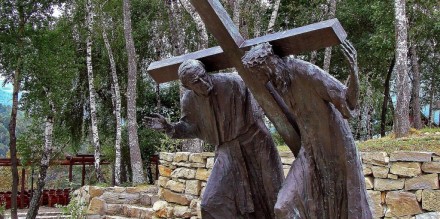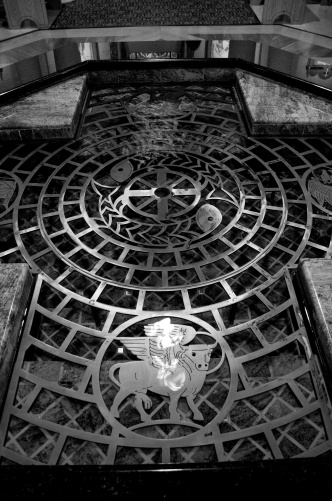 This is a guest post by Julia Sadusky, a doctoral candidate in the Doctoral Program in Clinical Psychology at Regent University, where she previously served as the Research Assistant for the Institute for the Study of Sexual Identity and completed clinical rotations in the Sexual and Gender Identity Clinic. Julia recently defended her dissertation, which was a qualitative study of loneliness among celibate gay Christians.
This is a guest post by Julia Sadusky, a doctoral candidate in the Doctoral Program in Clinical Psychology at Regent University, where she previously served as the Research Assistant for the Institute for the Study of Sexual Identity and completed clinical rotations in the Sexual and Gender Identity Clinic. Julia recently defended her dissertation, which was a qualitative study of loneliness among celibate gay Christians.
My dissertation, “Loneliness and the Celibate, Gay Christian,” delved into the lives of individuals navigating the intersection of faith and same-sex sexuality, in order to understand their experience of celibacy, loneliness, and coping. I hope to share some of the findings, which may have relevance to some of the Spiritual Friendship readership.
Purpose & Methods:
The aim was to understand the experience of loneliness for Christian sexual minorities who are not involved in sexual relationships. All participants were adult Christians experiencing same-sex sexuality who made a commitment to celibacy five or more years ago. After asking participants open-ended questions, each case was analyzed individually, by constructing themes based on the consensus of a team including the principal investigator, multiple coders, and an external auditor, according to an analysis process called Consensual Qualitative Research (CQR.) Due to the limited research in this area, open-ended prompts allowed participants to describe their experience more vividly.
Research Questions:
Within the study, four research questions were asked: 1) What factors contribute to the decision to choose celibacy for those who do so? 2) Do celibate, gay Christians who commit to celibacy experience loneliness as a result of their decision to forego same-sex sexual relationships? 3) What are the impacts of loneliness for those who report it? 4) What coping skills have celibate, gay Christians used in coping with loneliness and which of these have they found helpful?
Who we interviewed:
We interviewed fourteen participants between the ages of 18 and 60+. There was an even split with regard to gender and denomination (Roman Catholic and Protestant participants). When it came to the use of labels, participants varied. Two did not use any sexual identity label (gay, same-sex attracted, lesbian), although they reported same-sex sexuality. Some individuals privately labeled themselves as “gay” to describe their enduring same-sex attractions, but publicly identified as same-sex attracted or allowed others to assume heterosexuality. Some individuals previously identified as gay, but at the time of the study no longer used that label.
Relevant Factors in Pursuit of Celibacy:
The most commonly reported factors that impacted the pursuit of celibacy were personal faith, one’s view of celibacy, social influences, and interpretation of scripture around marriage and sexuality. For personal faith, one participant said, “I am abstinent because I know that God loves me. That is who I am, and I do not have to change anything for God to love me… And my way to love God, you know, my reaction of being loved is in loving God back, and in doing so, I would like to follow his teachings. And these Christian teachings say that same-sex attraction is okay but the action, using your sexual/genitals, is not the way that God intended it to be.”
When it came to view of celibacy, most participants felt celibacy was a choice they made. For one female participant, “…obviously it’s a requirement for a Christian to live sexually as is prescribed in scripture which is in marriage between a man and a woman… It’s still my choice whether or not to do it. I mean I can choose any number of things that are outside of a biblical way of living and this is just one more of those that I have chosen to live without.” Others perceived celibacy as a calling or a spiritual discipline, much like fasting, or the only viable option in light of enduring experiences of same-sex attraction. When it came to social influences, the primary source of this was one’s faith community. Less common supports, although they were integral for those who reported them, included mentors, spiritual directors, ministry groups, and role-models.
Attributions about Experience of Loneliness:
The next research question asked whether or not participants attributed their experiences of loneliness to their state in life as celibate, single Christians. Research describes loneliness as a universal experience, although celibate Christian sexual minorities could be more at risk for loneliness since intimate partners serve as a buffer against loneliness. All but one of the participants attributed their experiences of loneliness to celibacy. The lack of intimate relationships, and the lack of companionship and lack of sexual intimacy that are part of those intimate relationships resulted in loneliness. Another common theme was that, being celibate made forming community much more difficult, in that there is a lack of societal structure for celibacy. They were often not well-accompanied by the church because of their status as single people, as sexual minorities, and as celibate people. One participant said, “…we have got the theological reasoning down pat, in terms of the fact that gay people shouldn’t be getting married and having sex. But the church, we the church have failed because we don’t have the intermediate structures institutionally to make that a plausible, livable, life choice and option for a lot of people.”
At the same time, participants made other attributions for their experience of loneliness, indicating it as a universal experience (“…Loneliness is just a very human feeling. Everyone will feel [it] in their lifetime in many times. I think it is a signal or indicator that you desire to be connected to something meaningful,”) as a result of low social support, or as a consequence of marginalization that would exist whether they were celibate or not (“I am no more lonely as a celibate person as I was when I was sexually active.”)
Aspects of Life Impacted By Loneliness:
When identifying aspects of life impacted by loneliness, participants noted: universal impacts, social impacts, psychological impacts, spiritual impacts, and physical impacts (exhaustion, difficulty sleeping). Social impacts included isolation from others, dissatisfaction with friendships or community they do have, a perceived lack of belonging (“…I felt like I didn’t belong anywhere… I wasn’t straight, I wasn’t gay, I wasn’t married, I wasn’t…wasn’t…wasn’t”) and, conversely, perceived closeness with others, in the event that loneliness drove them to reach out for support.
Psychological effects were both cognitive and emotional. When lonely, individuals might reconsider celibacy, be hyperaware of singleness and ruminate on this, and negatively self-evaluate as a result of their feelings of loneliness. Participants described a range of negative affective experiences, such as sadness, feelings of powerlessness, self-pity, hopelessness, lack of motivation, depressed mood, and suicidal thoughts. Conversely, some reported increased motivation to mitigate loneliness through reaching out to God or others, despite the negative state they were in.
When it came to spiritual impacts, some participants spoke of distance from God (“…it’s feeling that you are not capable of facing your problems. And then, it can sort of spiral so that you also feel really distant from God and that is really painful and distressing. Because kind of obviously, if you aren’t capable of handling your problems, God is, but if God also feels super far away, then it is hard to know who you can turn to,”) and others reported increased intimacy with God (“… I don’t think that I would have the intimacy with God that I have now. I can definitely see his guiding hand in bringing these difficulties into my life and this difficulty in particular, because it has really pressed me toward him…”) For one person, loneliness led to an acute longing for heaven (“…stuff in this world is not the way it is supposed to be. And we are yearning forward to a goal that has not yet been completed or achieved, um. I think I have a more acute longing for heaven than other people I know and encounter, um, because there is something pretty substantial in my life that I don’t have that many other people do have. And so I do look toward that in that way…”)
Coping with Loneliness:
The final research question explored helpful and unhelpful coping skills to manage loneliness. When it came to helpful coping skills, there were general coping strategies (engaging in enjoyable activities, reading, occupation, volunteering/service, physical activity/exercise, projects/chores, travel, Netflix, and creative expression through art, journaling, and poetry reading), cognitive coping strategies (reframing circumstances, using gratitude to call to mind what they appreciate about life, focusing on the present moment, focusing on the needs of those around them and serving others, and gaining insight into triggers of loneliness), social coping strategies (investing in friendships or pursuing new friendships, group involvement through ministry groups or, as one person put it, “…find(ing) your people…I interact with people who are also gay/lesbian/transgender/nonbinary and share their struggles…I try to make multiple communities, in different things that I identify myself with. This helps a lot with loneliness. I don’t really feel lonely. I have people who care about me.”)
Other strategies included religious/spiritual coping strategies (religious practices, whether communally through worship, prayer and sacraments, or individual through prayer and spiritual readings, faith community involvement, Christian friendships and spiritual direction, experiences of intimacy with God in prayer by way of identifying with Christ’s suffering or seeing their relationship with God as spousal), and coping through self-disclosure of sexual identity: (“the greatest defense against loneliness is giving people the chance to know you…when I feel known, I feel less lonely…it always is really cathartic and really meaningful,”) and psychological interventions, such as therapy and medication.
When it came to unhelpful coping, the most common were compulsive behaviors (overeating, pornography, masturbation, excessive shopping, substance abuse), isolation, and unhelpful thoughts (rumination, negative self-talk). Others included lashing out at others and self-harm behaviors. These are labeled unhelpful in that they ended up, in the long-term, increasing the loneliness participants felt, even if they relieved loneliness temporarily.
Where do we go from here?
The results of the study show that many of the participants lacked a support system where they felt that they belonged fully. Without a nuclear family as they got older, there were fears of the sustainability of singleness, especially in bouts of loneliness. Participants highlighted that, even more than the lack of a romantic partner, it was the lack of access to supports that many married people have, such as avenues for intimacy, companionship, healthy models of celibacy, and a vision for a future they could thrive in, that made celibacy challenging. Participants showed that loneliness often leads to negative thoughts of self and affective experiences that make engaging in meaningful relationships difficult. Participants described this as a domino effect, where their focus on self led to negative beliefs about themselves and negative expectations of their future. The positive impacts of loneliness included the opportunity for personal growth through painful moments, increased closeness with God and others, and increased motivation to mitigate loneliness. When it comes to coping, social coping offered the sense that a person uniquely belonged. For Christian sexual minorities, though, there are barriers to social coping, such as the fact that, in Christian circles, there is more emphasis on the value of romantic relationships over singleness and building community hinges on having nuclear family. While self-disclosure facilitates intimacy with community, many participants did not engage in this, for fear of rejection from others.
Addressing Mental Health
It seems that few participants looked to therapy as a means of coping with loneliness. Therapy could be an excellent space to begin to address compulsive behaviors which exacerbate loneliness, incorporate principles such as gratitude and reframing circumstances to challenge negative thoughts that can come with loneliness, identify triggers of loneliness (such as attending weddings), developing a plan for engaging in meaningful connections when lonely, and considering religious practices that are personal and/or communal to engage in.
A Need for Discipleship
Christian churches can play an essential role in helping celibate Christians navigate loneliness, but there is much work to be done in this regard. Pastoral care ought to attend to the whole person, considering both short-term and long-term negative and far-reaching impacts of loneliness, making referrals to mental health professionals when necessary. It is important to be attentive to the way loneliness can hurt one’s sense of closeness with God and others in their community, making the very strategies that help manage loneliness difficult to access.
It is clear that celibate sexual minorities are hesitant to share their experience of loneliness, for fear of disclosing their sexual orientation to their church family. Few turn to means such as mentoring, spiritual direction, or Christian friendships as they cope with loneliness. Many fear burdening others or expect negative reactions if they share about their same-sex sexuality, and thus suffer their loneliness in isolation. It would be beneficial for sexual minorities to experience faith communities where there is openness to dialogue that normalizes loneliness as a universal experience, without negating the unique challenges they face. Participants often felt so unique that they could not be offered discipleship, as if they were the only ones struggling to feel like they belong, perpetuating the loneliness they already feel.
Drawing from distinctively Christian themes
There are valuable Christian themes that helped individuals make meaning out of loneliness and cope with it without a loss of faith or purpose. Meaning-making buffered against negative thinking patterns such as “I am defective” or “I will always be alone.” In the face of loneliness, seeing one’s relationship with God as spousal, and identifying with Christ’s own suffering were unifying experiences that helped lessen the effects of loneliness. It was also helpful to normalize the moments of perceived distance from God. This validated that individuals were not deficient or lacking faith when they felt lonely or far from God in their suffering. Some participants found solace in historical Christian reflections on the redemptive value of suffering, even when suffering is unwanted and does not seem to have an expiration date on this side of eternity. Rediscovering the value of celibacy and singleness, seeing these states in life as opportunities to serve Christ and others, and inviting the church to embody a “family” are other essential steps in making celibacy a sustainable and life-giving reality for those who pursue it. Without these, Christian sexual minorities are left to wonder how they could live out the life they believe God has called them to, and thrive within that call.
Limitations:
Limitations of this study include, convenience sampling, which puts constraints on the generalizeability to individuals who do have access to the supports of the ministry organizations. Further, the sample was mostly homogenous in terms of race and educational level. Biases also limit the findings, such as the fact that the data relies on self-report about the experience of loneliness. Much is left to be understood about how to come alongside those integrating their faith and sexuality in this way, and the hope is that future research will help us in this endeavor.










You must be logged in to post a comment.